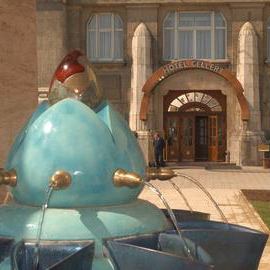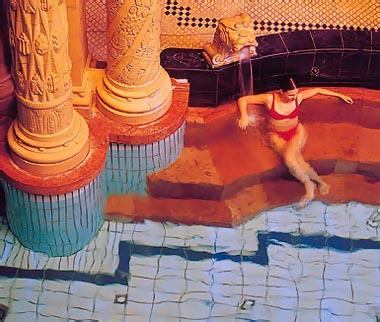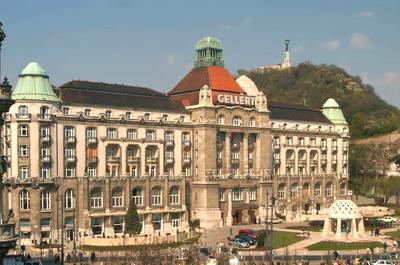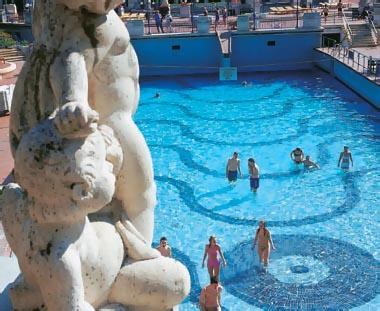 It’s winter here in Budapest, but nobody seems to mind and every person that I meet swims daily.
It’s winter here in Budapest, but nobody seems to mind and every person that I meet swims daily.
Here, where springs are a national resource, bathing in one of the city’s 130 mineral spring pools is part of the local lifestyle. The minerals (sodium, magnesium, sulfur and fluoride) in the waters are considered an antidote to rheumatic pains and arthritic conditions.
These springs have earned Budapest the reputation as the “Bathing City” and as an international medicinal bathing area since at least the 1930s.
Beyond the pools, this city-combination of Buda and Pest appeals on many levels including a history influenced by Mongols, Turks and Romans.
Pedestrian Buda Hill—a UNESCO World Heritage Site—is home to a medieval castle (within the Royal Palace) and a stunningly restored Gothic church, St. Matthias, located across from the street from the Hilton Hotel.
Related articles:
Pest, on the other side of the Danube River, is home to the Andrassy (a Champs-Elysee-like boulevard) where you can visit a neo-Renaissance-styled Opera House, a Byzantine-Moorish influenced Great Synagogue and a variety of Belle Epoque, Art Nouveau and Bauhaus-styled buildings. Art-rich museums, coffee houses with fancy pastries, meals featuring Magyar wines (tojaj) and fabulous foie gras and a vibrant music scene add to the city’s charms.
 I visited Hungary to see those famous spring-fed pools and experience the health spa resort facilities that the Danubius Hotel Group developed around them. Each features fabulous aquatic facilities, with thousands of square feet of heated pool space (and outdoor pools). I love summer, so I chose the body temperature pools with muscle-relaxing jets, though I sampled some pools that were a few degrees cooler and an exercise pool outfitted with bars to hold.
I visited Hungary to see those famous spring-fed pools and experience the health spa resort facilities that the Danubius Hotel Group developed around them. Each features fabulous aquatic facilities, with thousands of square feet of heated pool space (and outdoor pools). I love summer, so I chose the body temperature pools with muscle-relaxing jets, though I sampled some pools that were a few degrees cooler and an exercise pool outfitted with bars to hold.
I ignored the icy pool where brave souls boosted their circulation by repeatedly moving from hot to cold waters. The health spa resorts that I visited all have fitness facilities, beauty salons ($15 blow dry) and treatment areas. Clients on week-long packages (most Europeans accept the benefits of the sauna, swim, massage lifestyle and stay for at least two weeks) are first seen by a doctor who prescribes daily treatments (a 20-minute massage, a mud pack, etc.).
Fancier spa services, like wraps or aromatherapy baths are à la carte. Danubius spa hotels offer accommodations for the physically challenged (a single room that connects to a double room) as well as allergy-free rooms, so it’s not uncommon to see folks in wheelchairs or walkers.
In Budapest, many of the springs feed stunning public swimming pools including the recently restored Széchenyi—a neo-Baroque complex where 13 of the 18 pools are thermal and men play in-water chess as steam rises around them. Others supply large neighborhood pools and the small, Bauhaus-styled jewel known as the Dandár.
 At the grand dame Danubius Gellért Hotel, the Gellért Bath is exquisitely romantic; both the indoor and outdoor pool complexes (and the recently renovated exterior of the building) are beyond beautiful. While the Gellért’s former glory is apparent, it appears past its prime and in need of fresh paint, new carpeting, soft goods and air conditioning.
At the grand dame Danubius Gellért Hotel, the Gellért Bath is exquisitely romantic; both the indoor and outdoor pool complexes (and the recently renovated exterior of the building) are beyond beautiful. While the Gellért’s former glory is apparent, it appears past its prime and in need of fresh paint, new carpeting, soft goods and air conditioning.
We stayed at the comfortable, four-star Danubius Health Spa Resort Margitsziget where the contemporary accommodations offer two single beds together, a desk, chairs and coffee pot (but no scale, safe or make-up mirror) and a nice-sized balcony overlooking the park-like island and the city. The hotel is linked to the more traditionally-styled 164-room (four-star superior) Danubius Grand Hotel Margitsziget which features marble hallways and stairwells and rooms with wooden paneled walls and antiques.
Both hotels are linked to the spa; the complex is the only commercial entity on the pedestrian-only Margaret Island situated in the middle of the Danube and an easy cab ride from either the Buda Hill or the Pest city center.
Shortly after arriving, I had my first taste of how Hungarian spas differ from the over-the-top, extraordinarily expensive, pleasure, pampering palaces which I have learned to love. The good news is that these facilities are both phenomenal and affordable. (For a pampering spa in an incredibly luxurious venue, go to the Four Seasons Gresham Palace Budapest!)
The Danubius Health Spa Resort packages include all you can eat buffets at breakfast and dinner with spa-style selections for those avoiding traditionally cream-rich Hungarian specialties.
 What’s different? The emphasis is on wellness, not pampering and the typical massage is a 20-minute treatment. Curtains—or bathroom stall-like walls—separate some cubicles. Massage tables are minimally padded and I missed those American spa-style toasty heated mattress covers, silky linens and fluffy towels. (Advice to travelers: pack a beach towel, bring your own slippers and pay a reasonable extra fee for a 40 or 60-minute massage.) Point to the body parts that hurt, because although hotel employees speak English, I didn’t find any practitioners who did!
What’s different? The emphasis is on wellness, not pampering and the typical massage is a 20-minute treatment. Curtains—or bathroom stall-like walls—separate some cubicles. Massage tables are minimally padded and I missed those American spa-style toasty heated mattress covers, silky linens and fluffy towels. (Advice to travelers: pack a beach towel, bring your own slippers and pay a reasonable extra fee for a 40 or 60-minute massage.) Point to the body parts that hurt, because although hotel employees speak English, I didn’t find any practitioners who did!
In the countryside, a couple of hours from Budapest, I stayed in Heviz—a resort town that’s home to the largest thermal spring lake in the world and famed for its therapeutic mud and mud treatments. Each of the Danubius Health Spa Resorts in this town, as well as those that I visited in the tiny towns of Buk and Sarvar, have similar programs, facilities, even menus. Heviz, however, appeared to be the most popular for Americans because the resort community has a shopping street, some restaurants and, of course, the park with its heated lake centerpiece.
IF YOU GO
Delta flies direct to Budapest. For the three resorts in the countryside, visitors can fly into either Budapest or Vienna and rent a car at the airport. Tradesco Tours (www.tradescotours.com) specializes in customized individual (and group) visits to Hungary and arranges stays at three to five-star deluxe hotels, including all the Danubius Hotel Group properties (danubiushotels.com). Call 800-448-4321 or 239-495-5076. If you hire a driver, I recommend Attila Bator (Bator68@gmail.com).
THE PRICE TAG
A seven-night stay at Danubius Spa Resort Margitzeget (including half board and six treatments) costs about $1,000 per person, with a 20 percent discount if booked through Tradesco by February 28, 2009.
Irvina Lew is a freelance food and travel writer who specializes in spas worldwide. She is also the author of Romantic Weekends In and Around New York.
Related articles on PeterGreenberg.com:












